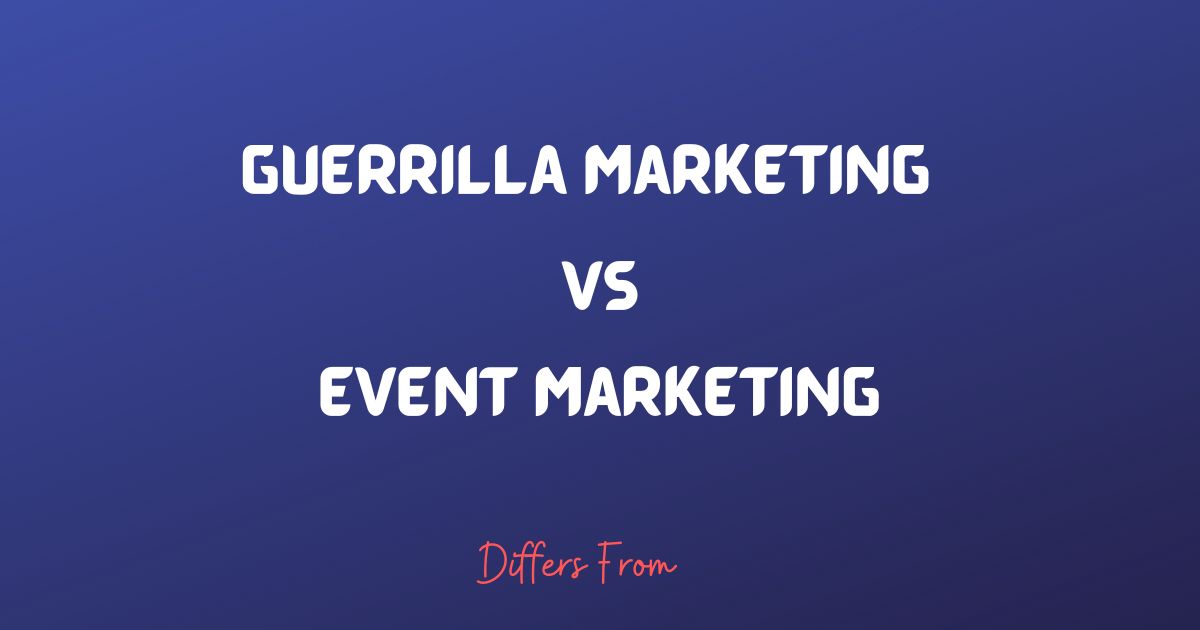In the dynamic world of marketing, countless strategies and tactics are employed to capture the attention of potential customers and leave a lasting impact.
Two distinct approaches that often stand out are Guerrilla Marketing and Event Marketing. While both are powerful tools in their own right, understanding the nuances of each can be the key to choosing the right path for your brand’s success.
Join us as we dive into the fascinating world of Guerrilla Marketing and Event Marketing, exploring their differences, applications, and the unique strengths they bring to the marketing landscape.
Whether you’re looking to make a big splash or build lasting connections, this guide will help you navigate the exciting realms of these marketing strategies.
Difference between Guerrilla Marketing and Event Marketing
| Guerrilla Marketing | Event Marketing | |
| Definition | It targets a broad audience, often relying on the viral spread of the campaign. | Marketing efforts centered around planned events or experiences to promote a product, service, or brand. |
| Nature | Typically one-time, short-term campaigns that aim to create buzz and excitement. | Involves the organization of specific events, often with a scheduled date and location. |
| Reach | Targets a broad audience, often relying on the viral spread of the campaign. | Targets a specific audience attending the event, which may be smaller but more focused. |
| Cost | Relatively low cost as it relies on creativity and unconventional approaches. | Costs can vary widely depending on the scale and scope of the event, potentially involving higher expenses. |
| Timing | Can be executed at any time and may not be tied to a specific schedule. | Requires careful planning and adherence to event schedules. |
| Examples | Flash mobs, graffiti marketing, viral social media campaigns. | They are designed to promote a product, service, and interaction at a specific event. |
| Goals | Often aimed at creating brand awareness, generating buzz, and word-of-mouth marketing. | Unconventional, low-cost marketing tactics often involve surprise or ambush strategies. |
What is guerrilla marketing?
Guerrilla marketing is a creative and unconventional approach to marketing that captures attention and generates buzz through unexpected and memorable tactics.
It can involve anything from flash mobs and viral videos to street art and publicity stunts. By defying traditional marketing norms, guerrilla marketing aims to make a lasting impression and create a word-of-mouth effect among consumers.
What is event marketing?
Event marketing is a strategic approach that involves organizing or participating in events to promote a brand, product, or service.
It offers a unique opportunity for direct interaction with the target audience, fostering personal connections and creating memorable experiences.
Events can range from trade shows and conferences to product launches and experiential activations, effectively combining marketing and entertainment elements.
Comparison between guerrilla marketing and event marketing
Guerrilla marketing and event marketing are both creative approaches that aim to capture attention and engage audiences. However, they differ in several key aspects:
Approach
Guerrilla marketing focuses on unconventional and unexpected tactics, often utilizing low-cost or grassroots methods to generate buzz.
In contrast, event marketing centers around organizing or participating in specific events to promote a brand or product.
Nature of Engagement
Guerrilla marketing seeks to create memorable and interactive experiences through unique and attention-grabbing campaigns. It often targets individuals in public spaces, encouraging participation and fostering word-of-mouth promotion.
Event marketing, on the other hand, involves direct engagement with audiences in a controlled event setting, providing opportunities for face-to-face interactions and brand immersion.
Scale and Scope
Guerrilla marketing campaigns are typically smaller in scale and localized, targeting specific locations or communities. They can be executed quickly and have a shorter duration.
Event marketing, on the other hand, can vary in scale, from small-scale gatherings to large-scale conferences or festivals, catering to a broader audience.
Cost
Guerrilla marketing often emphasizes creativity and resourcefulness over high financial investment, making it a cost-effective approach.
In contrast, event marketing requires a more substantial financial commitment to cover event planning, logistics, venue, equipment, and promotion.
Objectives
Guerrilla marketing aims to create a viral or buzz-worthy effect, generating awareness, interest, and brand recognition. It often focuses on creating a memorable impression and sparking conversations.
Event marketing aims to build relationships, generate leads, and enhance brand loyalty by providing an immersive experience that showcases products or services in a favorable light.
Timing and Duration
Guerrilla marketing campaigns can be implemented spontaneously or as a short-term initiative, while event marketing involves careful planning and longer lead times to organize and execute successful events.
Interesting facts about guerrilla marketing and event marketing
- Guerrilla marketing often leverages unconventional locations and mediums to create memorable experiences, such as using public spaces, street art, or graffiti as promotional platforms.
- Guerrilla marketing campaigns are known for their viral potential, with the ability to rapidly spread through social media and generate buzz among target audiences.
- Some guerrilla marketing campaigns incorporate elements of surprise and spontaneity, catching people off guard and increasing the chances of capturing their attention and curiosity.
- Event marketing allows brands to directly engage with their target audience, creating personal connections and fostering brand loyalty through face-to-face interactions.
- Events provide an opportunity for brands to showcase their products or services in a controlled environment, allowing consumers to experience them firsthand.
- Event marketing enables brands to gather valuable insights and feedback from attendees, helping to refine their marketing strategies and improve their offerings.
- Events can serve as platforms for product launches, allowing brands to build anticipation and generate media coverage, resulting in increased visibility and reach.
- Both guerrilla marketing and event marketing can create a sense of exclusivity and generate a buzz by using limited-time offers, exclusive access, or VIP experiences.
- Guerrilla marketing campaigns often rely on creativity and innovation rather than large budgets, making it accessible to small businesses and startups.
- Event marketing provides opportunities for partnerships and collaborations with other brands or influencers, amplifying reach and tapping into new target audiences.
Conclusion
In conclusion, guerrilla marketing and event marketing are distinct approaches in the world of marketing. Guerrilla marketing focuses on unconventional, low-cost tactics to create buzz and engage audiences in unexpected ways.
On the other hand, event marketing involves organizing or participating in events to directly interact with the target audience and create immersive brand experiences.
Both strategies have their unique benefits and objectives, offering opportunities for creative promotion and engagement.

